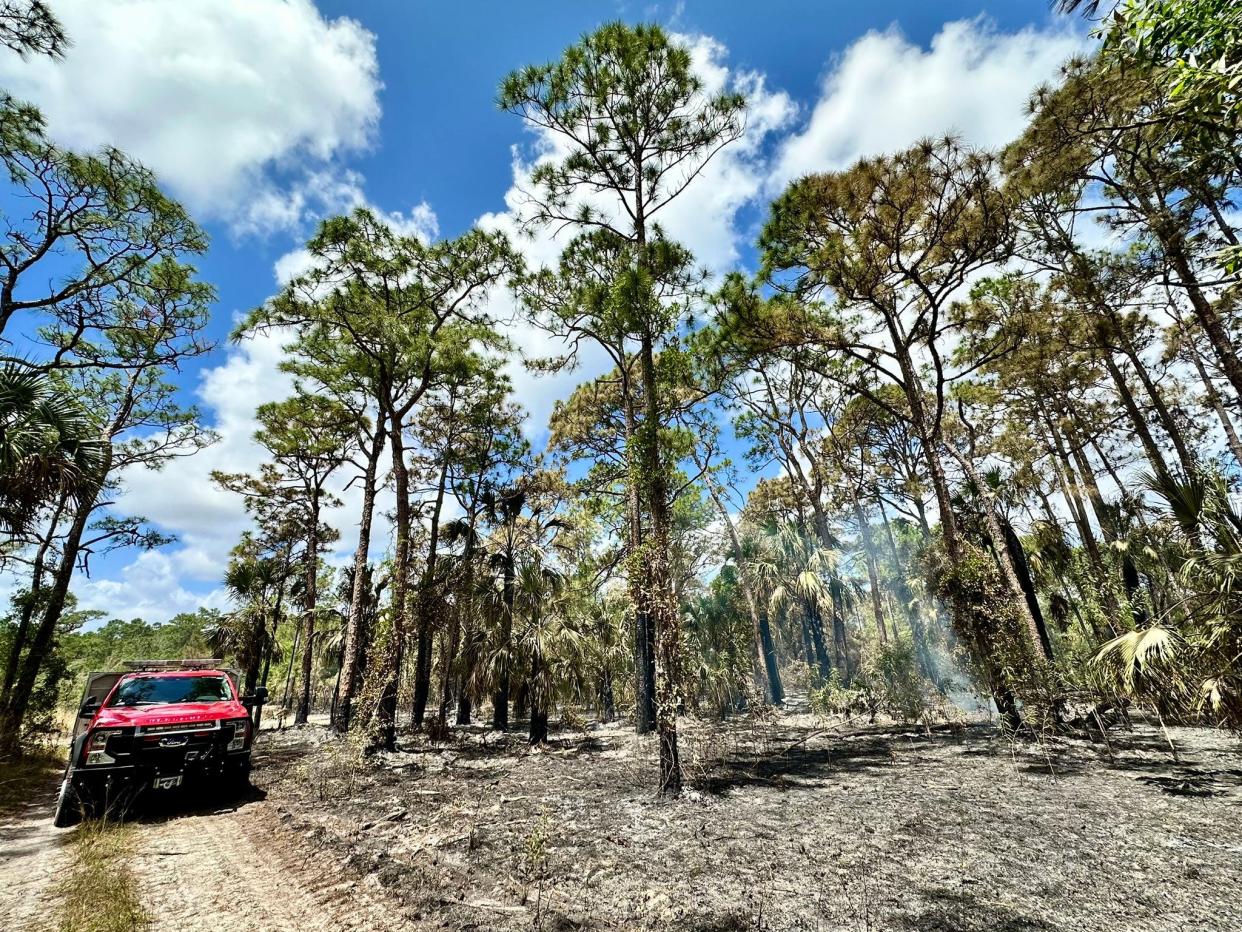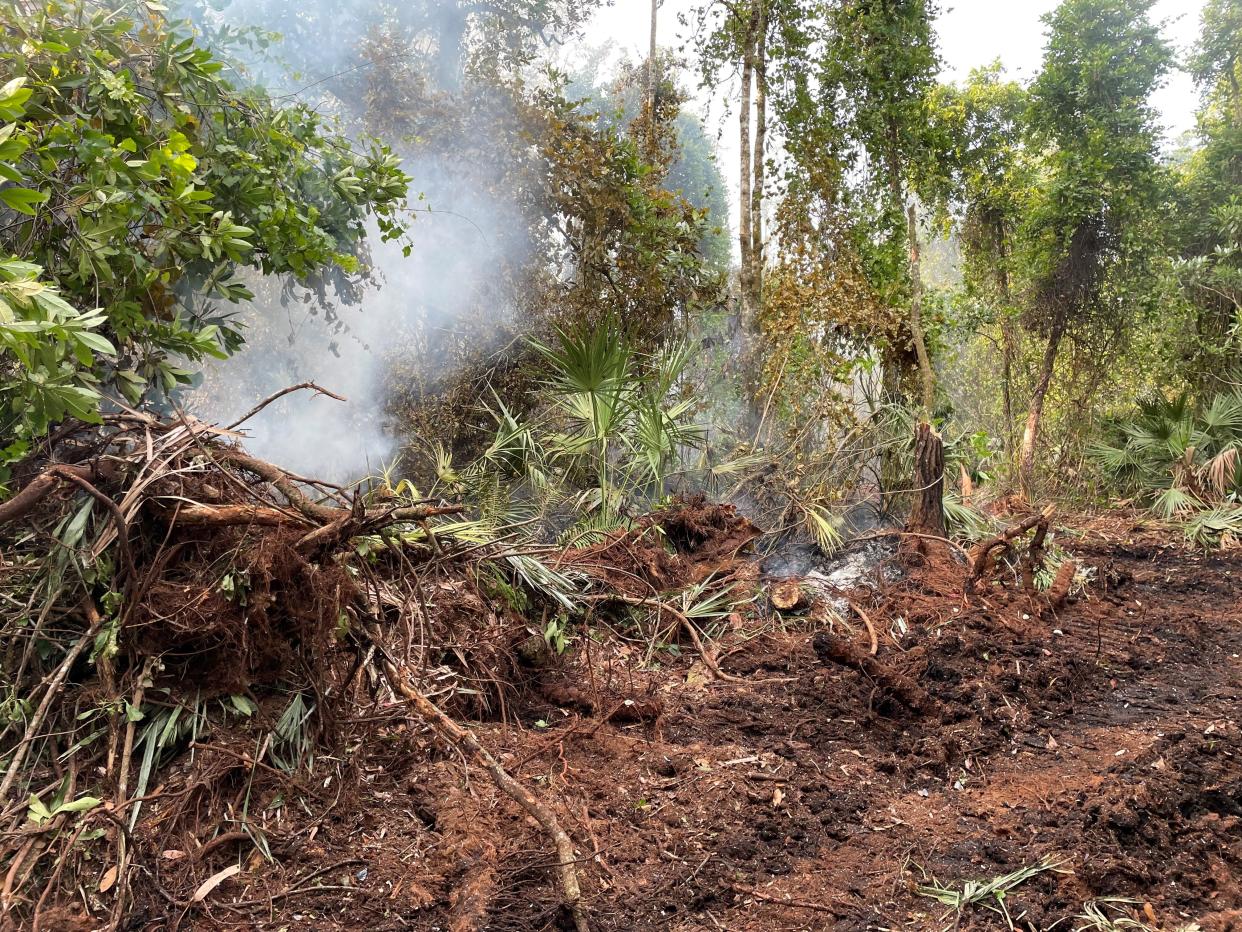NWS Red Flag Warning over dry, windy, hot conditions; counties step up burn restrictions
Ongoing dry conditions have led to fire warnings and restrictions on burning across the Treasure Coast.
The National Weather Service placed Indian River and St. Lucie counties under a Red Flag Warning Friday, which means strong winds, low humidity and warm temperatures could lead to "critical fire weather conditions."
Martin County Fire Rescue declared any burning activity Friday was not permitted due to what the agency said were increased wildfire concerns amid worsening drought conditions.

Firefighters stopped an outside fire Wednesday that threatened to "spread out of control" near Allapattah Flats Wildlife Management Area, according to the agency's social media post. It is 15 miles west of Stuart.
Indian River County has been under a burn ban since April 8, and on May 8 county emergency officials declared a local state of emergency with a mandatory burn ban for all areas of the county "until further notice."
All outdoor burning is prohibited unless specifically permitted by the Florida Forest Service, according to the Department of Emergency Services.
The agency stated all outdoor fires were prohibited unless authorized by the Florida Forest Service, or consisted of food cooked on a gas or charcoal grill.
The National Weather Service Red Flag Warning was in effect from 1 p.m. to 7 p.m. Friday. According to the U.S. Forest Service the warnings are made on a daily basis, or one 24-hour period at a time during which wind speeds are above 20 mph, relative humidity is 15% or less and there is a high to extreme fire danger rating.

As of Friday, no burn bans were in place in St. Lucie County.
The Treasure Coast was under moderate drought conditions Friday, according to the National Oceanic and Atmospheric Administration's drought monitor site, Drought.gov.
About 14% of the state is in this category, from northern Palm Beach County to mid-Brevard County, and portions of Okeechobee, Glades, Osceola and Hendry counties. About 27% of the state is experiencing abnormally dry conditions. No counties have severe drought.
In a moderate drought, burn bans are possible, trees and bushes begin browning and water supply decreases.
The Florida Forest Service uses the Keetch-Byram drought index (KBDI), which acts as a scale to estimate dryness of soil.
The index scale ranges from 0, which means there is no moisture deficit, to 800, according to Florida Department of Agriculture and Consumer Services.
As of Thursday, the latest date available from the Florida Forest Service, Indian River County was the driest of the Treasure Coast counties, within a 550-599 range, while both St. Lucie and Martin counties were in the 500-549 range.
What is considered wet season typically begins in the third to fourth week of May, when sea breeze and low systems bring rain and thunderstorms, said meteorologist Kole Fehling, with the National Weather Service Forecast Office in Melbourne.
Rainfall amounts
Parts of the Treasure Coast are 6 or 7 inches below what their total rainfall should be by this time of year.
Indian River County typically has 12.07 inches of rain by May. As of Friday, it's had 5.35 inches, which is down by 6.72 inches, according to NWS Meteorologist Tim Sedlock.
In Fort Pierce he said a total of 5.61 inches of rain had been recorded since January, which is a departure from the normal 11.3 inches by 5.82 inches.
In Stuart, a total of 10.46 inches so far this year could not be compared because the agency does not have an official weather data recording site in Martin County, Sedlock said.
Both Vero Beach and Fort Pierce last saw "trace" amounts of rain May 1, while Stuart received 2 inches of rain on that date.
Total rain amounts for April, Sedlock said, were "not very good," with .45 inches of rain in Vero Beach, .55 in Fort Pierce and .80 in Stuart.
More: 5 best Florida state parks to visit on the Treasure Coast
More: Brightline South Florida commuter pass to cost more for fewer rides and no Orlando leg
More: 'Bar Rescue' will feature Port St. Lucie establishment in Sunday's episode
Corey Arwood is a breaking news reporter for TCPalm. Follow @coreyarwood on X, email corey.arwood@tcpalm.com or call 772-978-2246.
This article originally appeared on Treasure Coast Newspapers: Treasure Coast steps up burn restrictions amid dry, windy, hot days
